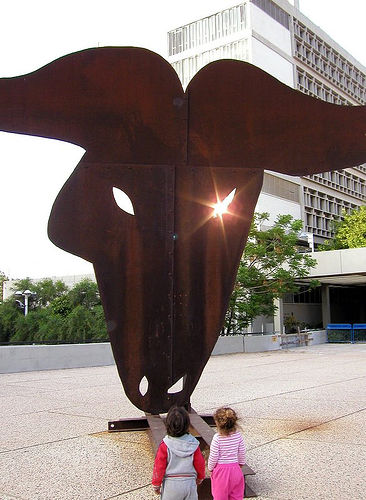
“The road to hell is paved with good intentions.” We all have good intentions, yet in the end, whether through procrastination or distraction, we usually fail to accomplish all we had hoped. I’m often saying, “Today, I’m going to start my diet and workout,” but instead find myself forgetting to even do the most basic stretches while being tempted by the sweets I love so much. No matter how well intentioned I may be, if I don’t act proactively, I will remain overweight and, most likely, gain even more. I’m sure I’m not alone in these sorts of struggles.
While we may not have a “hell” per se in Judaism, this proverb is actually quite Jewish in nature. Judaism isn’t about intentions, it’s about actions. Having faith in God is not enough, there are concrete things we’re expected to do. Believing that you should say a blessing over meals yet constantly forgetting is considered no better than not believing in blessings at all. Even actions without intention, such as saying the blessing when you don’t necessarily believe you need to, is generally viewed as better than intention without action. Maybe, in this case, the Jewish version of the proverb would be, “Good intentions pave nothing.”
But there is another way of looking at the old expression that may be harder to relate to. Sometimes we do the wrong thing, actually “sinning” when we meant to do good. It is this sort of failed intention that this week’s Torah portion, Ki Tissa, addresses.
The Israelites have been a holy nation, saved from the whips and spears of the Egyptians by God’s own “hand.” Besides a little whining, they have followed Moses, loyally doing as he’s commanded. They have been excited to enter the Land of Israel, a land that has been promised to them by God. Now, Moses seems to be gone. He said he would be back, but it’s been longer than expected. They are beginning to worry he may be dead. With Moses gone, they decide to make themselves an idol, both for worship and for leadership on their journey.
Obviously, creating a golden calf was a bad idea, but what was their intention? They gave their gold, perhaps as a sign of rejecting materialism in favor of some form of spirituality. They also aren’t screaming that they want to go back to Egypt anymore, they say they want their idols to go before them, to lead them as they continue their journey. Rashi, long considered the most essential Medieval Torah commentator, rushes to their defense, teaching that these events actually occurred earlier in the story, before the giving of the 10 Commandments. They may not have even known they weren’t supposed to be making idols–remember they just came out of Egypt where everyone had them. In this case, good intentions–having a focus for their spirituality and continuing their exodus, were actually what led them to make a massive mistake.
It’s possible you don’t buy that there were any good intentions in their actions. I think most people may even agree with you. Fine. There is another example we can use within the portion that does show such a situation, that of Moses’ brother Aaron. Does the story not show that it was Aaron himself that created the golden calf? He collected the gold and he cast it into the cauldron, forging the golden calf. Here, Rashi’s defense is more convincing. He explains that when Aaron asked for the gold, his hope was that the people would change their minds at the idea of having to give up their possessions. When he cast the gold into the cauldron, he never intended to form the calf, rather the runaway Egyptian sorcerers among them cast a spell that turned it into the calf. Once formed, he even tried to stall the people from worshiping it by telling them there would be a festival the next day. If Rashi is correct, we see Aaron’s intentions were good throughout the story, yet it was these actions that laid the path for the children of Israel to partake in idolatry.
But we aren’t left with this dark hopeless warning that even our good intentions can lead us down the wrong road. It’s easy to miss, but near the beginning of the portion, the Torah actually hints at the tools we possess that can help us avoid such a fate–Bezalel, the builder of the Tabernacle, his assistant Oholiab, and the wise men who help them in their work. Each one of these builders of God’s sanctuary represents different tools we can use. Bezalel, the chief architect of the Tabernacle and Ark of the Covenant, was gifted with such wisdom that, according to Rabbinic legend, he argued with Moses about the order in which its pieces should be built, and even won. Bezalel then symbolizes wisdom, teaching us that through it, we can build something great. But wisdom takes a lifetime to develop and it’s not foolproof. To assist us, we have Ohaliab. Ohaliab’s name means, “tent of [his] father.” Traditionally, the Rabbis interpret tent dwellers as those who study Torah, the tents being similar to a yeshiva. If, like Ohaliab, we study the faith of our fathers, we can learn to avoid those golden calf moments, matching our intentions with our actions, so that no matter what our hearts’ desires may tell us, we know in our minds what the right decision is. Finally we have the other wise men who joined them. Who are these sages? They are our communities, our friends and family who are there to help us, giving us the support and the push we may need to keep ourselves upright.
So while good intentions may pave the road in all directions, the street signs of wisdom, Torah study, and community are there to provide us with the direction we need to reach a meaningful life.
David Gutbezahl is a student at Gratz College.
